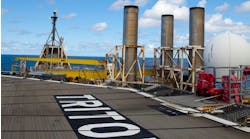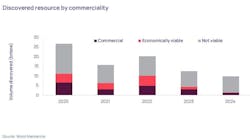Offshore staff
JAKARTA, Indonesia – In Indonesia, the Special Task Force for Upstream Oil and Gas Business Activities (SKK Migas) reports that 13 oil and gas projects are planned to produce in 2014.
Among these projects are Sisi Nubi 2B in the Mahakam block, with Total E&P Indonesie as the operator, the production of which is targeted at 350 MMcf/d (10 MMcm/d) in 1Q 2014; and the Senoro gas development, with JOB Pertamina-Medco Tomori Sulawesi as the operator, which is scheduled to begin production at 8 MMcf/d (226,530 cm/d) and 250 b/d of oil in 3Q 2014.
Three projects that were originally targeted to have their production in 2013 will also begin to produce in 1Q 2014 include Ridho field, operated by Odira Energy Karang Agung, with production of 1,200 b/d of oil; Gundih field, developed by Pertamina EP, with production of 50 MMcf/d (1.4 MMcm/d) and 600 b/d; and the Bayan A project, with Manhattan Kalimantan Investment as the contractor, with planned production of 15 MMcf/d (424,750 cm/d) and 250 b/d.
SKK Migas will monitor the Bukit Tua field of the Ketapang 2 block, with Petronas Carigali as the operator. The project is planned to produce of 70 MMcf/d (1.98 MMcm/d) and 20,000 b/d in 4Q 2014. Gas price negotiation process and change of potential buyer are issues that must be closely monitored. Additionally, this project adopts upstream and downstream scenarios that may lead to strategic policies beyond SKK Migas’ authority.
Of similar concern are the operations in the Muriah field of the Kepodang block operated by Petronas. This project, with 116 MMcf/d (3.28 MMcm/d) of production, is depending on the completion of gas pipeline in the downstream area. Construction of production facilities in the upstream area is expected to be completed in October.
The last project mentioned is the Banyu Urip field of the Cepu block, operated by Mobil Cepu Ltd. This project is planned to have production in 4Q 2014, with peak production of 165,000 b/d of oil. SKK Migas states that several obstacles to contend with for this project are related to economic-social issues and delays in the engineering process, procurement, and facility construction.
01/06/2014


